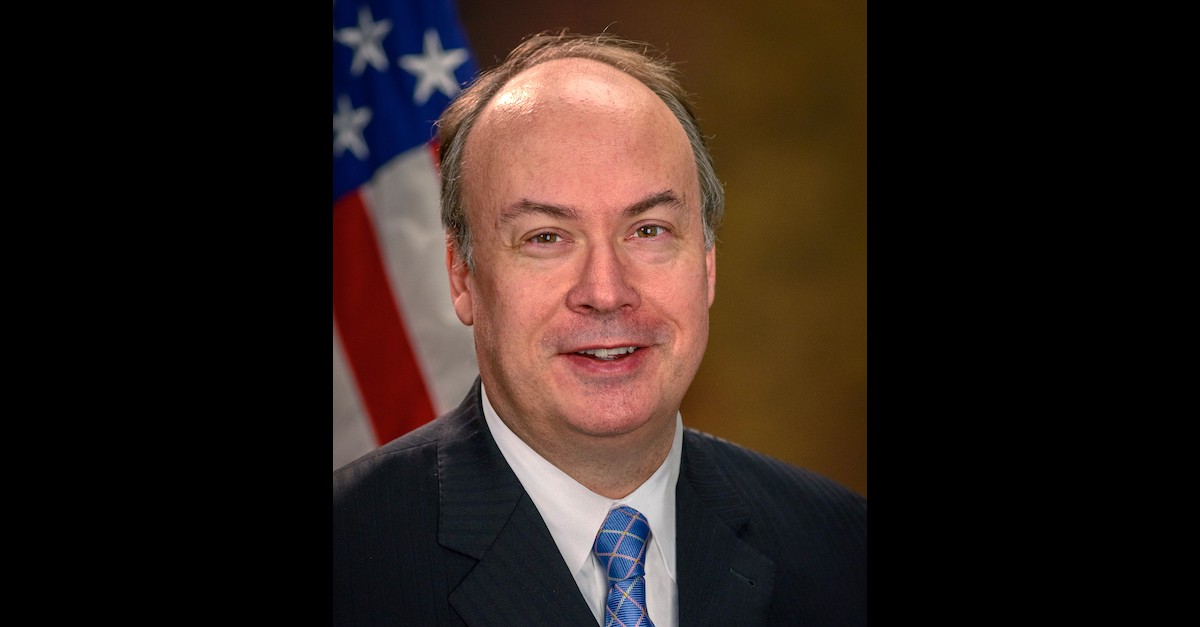
Donald Trump boards Air Force One to depart Washington, D.C. on Jan. 20, 2021. (Photo by Pete Marovich/Pool/Getty Images)
The legal world erupted Friday evening following a New York Times bombshell report that earlier this month, then-President Donald Trump tried to replace acting Attorney General Jeffrey Rosen with a sycophantic underling willing to use the power of the U.S. Department of Justice to force Georgia to overturn its election results.
Trump reportedly wanted Rosen gone because he refused to go along with efforts to pressure Georgia’s political leaders to “find” enough votes to swing the election in Trump’s favor. With Rosen out of the picture, Trump wanted to install a Jeffrey Clark, a loyalist who had already devised a plan to cast doubt on the tabulations, as the acting attorney general.

Jeffrey Bossert Clark (Image via the U.S. Department of Justice.)
According to the report, what ensued was a surreal three-hour meeting that very nearly resulted in all of the Justice Department’s top officials following through on a pact to resign en mass if Clark were to supplant Rosen.
“Their informal pact ultimately helped persuade Mr. Trump to keep Mr. Rosen in place, calculating that a furor over mass resignations at the top of the Justice Department would eclipse any attention on his baseless accusations of voter fraud. Mr. Trump’s decision came only after Mr. Rosen and Mr. Clark made their competing cases to him in a bizarre White House meeting that two officials compared with an episode of Mr. Trump’s reality show ‘The Apprentice,’ albeit one that could prompt a constitutional crisis,” the report stated. “Mr. Trump seemed somewhat swayed by the idea that firing Mr. Rosen would trigger not only chaos at the Justice Department, but also congressional investigations and possibly recriminations from other Republicans and distract attention from his efforts to overturn the election results.”
The stunning behind-the-scenes account of Trump’s efforts to retain power revealed just how close America was to the brink of a bona fide constitutional crisis.
President Trump spent four years decimating institutional norms, yet legal experts were stunned by the Times’ report. Many said it only further bolstered the House Democrats’ impeachment case against the now-former president.
“It alone is impeachable conduct and a basis to disqualify Trump from future office,” said UC Irvine professor of law and political science Rick Hasen.
Several of his professorial peers shared similar sentiments.
“This news bombshell fits hand in glove with the pattern charged in the Article of Impeachment,” wrote Harvard Law professor and constitutional law expert Laurence Tribe. “The effort to oust Rosen & install Clark to flip GA was part and parcel of the attempted coup that climaxed in Trump’s incitement of the January 6 insurrection.”
University of Texas law professor Steve Vladeck called the story “utterly insane.”
“If this kind of plotting was happening at DOJ, it was surely happening elsewhere, too. We still have no idea just how much impeachable misconduct Trump committed in the past few weeks — let alone the past four years,” he wrote.
Other attorneys, such as former federal prosecutor Ken White and Homeland Security consultant Paul Rosenzweig, noted that Clarke’s role in the debacle should not be forgotten.
“If this is true, every legal hand should be raised against Mr. Clark, every back turned on him, and no firm that employs him ever hired, cooperated with, or respected again,” White wrote.
“I thought I knew Jeffrey Clark,” Rosenzweig wrote, adding, “was I ever mistaken.”
“President Trump nominated Mr. Clark to be the Assistant Attorney General of the Environment and Natural Resources Division (ENRD) on June 7, 2017,” a DOJ biography says. “He was confirmed by the U.S. Senate on October 11, 2018 and sworn into office on November 1, 2018, followed by an investiture ceremony on November 15, 2018. The President also directed that Mr. Clark serve as well as the Acting Assistant Attorney General for the Civil Division effective September 3, 2020.”
The biography says he supervised 1,000 lawyers and would “personally handle select, high-profile cases.”
While serving as Acting Assistant Attorney General of the Civil Division, Clark handled the following types of cases, per the bio: “(1) national policies including military actions, counterterrorism efforts, law enforcement initiatives, fraud on the Treasury, and entitlement programs, (2) litigation so massive and span so many years that they would overwhelm the resources and infrastructure of any individual field office, (3) litigation filed in national or foreign courts; (4) cases crossing multiple jurisdiction; and (5) cases to remove illegal aliens.”
Hysterically, Clark’s education includes a bachelor’s from Harvard, a law degree from Georgetown, and a master’s degree from — get this — the Biden School of Public Policy and Administration at the University of Delaware. The school, of course, is named after Joe Biden, the man whose presidency the Times report claims Trump wanted Clark to derail.
The Times piece is based on interviews with “four former Trump administration officials who asked not to be named because of fear of retaliation.”
Clark told the Times that its “account contained inaccuracies,” but he would not say what they were. He also said “the strictures of legal privilege” prevented him from discussing his conversations with Trump.
“Senior Justice Department lawyers, not uncommonly, provide legal advice to the White House as part of our duties,” he further told the Times. “All my official communications were consistent with law.”
Moreover (again, per the New York Times):
Mr. Clark categorically denied that he devised any plan to oust Mr. Rosen, or to formulate recommendations for action based on factual inaccuracies gleaned from the internet. “My practice is to rely on sworn testimony to assess disputed factual claims,” Mr. Clark said. “There was a candid discussion of options and pros and cons with the president. It is unfortunate that those who were part of a privileged legal conversation would comment in public about such internal deliberations, while also distorting any discussions.”
Aaron Keller contributed to this report.